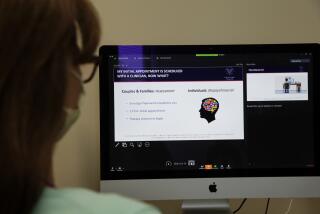Not All Therapy May Be Net-Worthy
- Share via
The client is living and working in a native village in the Arctic Circle. And is depressed.
The psychologist is in Maryland. They’re meeting for counseling sessions--on the Internet.
Over time, they’ve worked out how to meet regularly by e-mail, arranged how to pay for therapeutic sessions, found an electronic manner to explore treatment for someone in a place that’s about as remote as they get.
It’s one of those things that makes me a little nervous about the new medium. Therapy by keyboard?
A quick tickle of the electronic search engine keys shows that it’s simple to find dozens of sites that might provide anything from advice to medical treatment. In light of all those oft-repeated concerns, mythical and real, about electronic privacy and fraudulent posing, how’s a person to know whether it’s safe to turn to an anonymous counselor who’s decided to hang out an electronic shingle?
*
While the government worries about blocking sex and gambling on the Web, there’s a far more important trend going on in the multiplication of sites offering medical and mental health advice and treatment--totally unregulated, totally untrackable and available at the touch of a few electronic keys. The issues are just beginning to draw the attention of professional counseling organizations.
It’s no surprise that people would begin looking to the Web for personal counseling and advice in untangling emotional knots.
In much of the country--or the world--it might be difficult to get to a choice of therapeutic counselors, explained one psychologist with a Web site. So there is a lure of getting through immediately to someone who might listen. Or patients might be restricted by disability or by language.
And in Los Angeles, we have a bit of a tradition in people willing to call in to radio psychologists for words of guidance. Another psychologist explained that under the increasingly widespread influence of managed-care health programs, people are being asked to call 800 numbers to outline their emotional issues for referral to a counselor.
“Fully half of the people I hear from in person or over the Web are depressed,” said David I. Sommers, a psychotherapist (https://www.nicom.com/~davids). “There actually is a lot you can do in the first conversations about depression to get people acclimated and educated about it, and for that the Web is fine.” He calls his contacts “therapeutic consultations” rather than therapy.
*
“In 100% of the cases,” he said, “I’d prefer to be meeting than dealing by e-mail.” To compensate, he said, he tries to engage clients in extended e-mail conversations over time. At the moment, he has 15 Internet clients and has talked with perhaps 200 people.
“If I get someone who seems delusional, there is a referral right away,” Sommers said. “Some things are not appropriate for the Net.”
Indeed.
I, for one, still think that counseling is the sort of thing we want to reserve for face-to-face meetings. If we’re so pressed for time that we need to call in from car phones or dial up a therapist, maybe, just maybe, we’re not ready to deal very seriously with our emotional problems.
But if you’re nonetheless determined, for whatever reason, to go this route, there are a few ways to increase your chances of finding an advice giver who is legit and helpful.
Martha Ainsworth, an editor for Self Help and Psychology magazine, is now producing a site called Metanoia (https://www.metanoia.org) as an introduction to the world of online counseling. She outlines several of the pending legal, ethical and professional issues in a concise and clear manner and provides guides to sites that offer counseling and tips on some that should be avoided.
Another source is the Mental Health Net (https://www.cmhc.com), which, in addition to housing general information, has a directory listing for clinicians.
Most counseling sites so far appear to focus on career development issues.
It’s a good idea to look for a therapist who includes background information about education, just as in face-to-face contact. Clearly one should know upfront whether there are charges, what arrangements are in place for privacy and security and what kind of counsel is offered.
An example of the Best Avoided: a site at which the psychotherapist and location are anonymous, the intended interaction is likely one-time, and the contact will cost $9.95 per inquiry.
*
According to James P. Sampson, a Florida State University psychotherapist, there is growing concern about “the potential for harm resulting from poor-quality counseling over the Internet.”
He said such groups as the National Board for Certified Counselors are working to draft standards for professionals and the public. There are other efforts by groups focused on career development or vocational therapy in the United States and abroad.
“The poorly informed consumer in crisis who has a history of mental health difficulties will be an easy target for incompetent or fraudulent Internet counseling providers,” explained Sampson, who has published articles on the subject for the American Counseling Assn.
Still, Sampson, who has a career counseling resource site at https://www.fsu.edu/~career/techcntr, says, “Counseling over the Internet will become less strange over time” because of convenience or remoteness of service, and based on the experience with telephone counseling.
“This is a new frontier in terms of mental health,” says Ainsworth in Metanoia.
“As with any new frontier, risk and promise go hand in hand. There are many questions to be considered. The psychotherapists involved are asking them, and you should ask them too.”
Actually, just hearing that makes me feel better.


